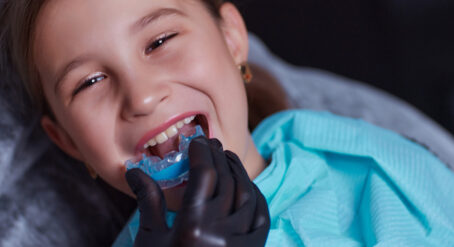Getting braces or clear aligner treatments like Invisalign®, Spark® and 3M Clarity can be great for your smile but there may be times when they’re bad for your breath. In this article, we will discuss why this problem exists, and some of the many ways in which you can solve it.
Can braces cause bad breath?
The first point to note is that it’s not actually your braces that smell bad: being made out of metal and ceramic, braces don’t really smell like anything at all.
But, connected as they are with brackets and wires which in turn connect to your teeth, braces can often provide tiny food particles with tiny little places to hide.
And if said particles aren’t removed more or less straightaway, they quickly become a source of food for bacteria. Bacteria and their waste products are the culprits that produces an unpleasant odour.
Other reasons for bad breath include gum disease, poor oral hygiene, certain drinks, and smoking.
Tips to prevent bad breath with braces
If you’re finding difficult to keep your breath smelling fresh (or at least, less noticeable) then there are some easy tips that are orthodontist-approved to look after your oral hygiene while undergoing orthodontic treatment.
Brush as often as possible
This simple problem has a simple solution: get those particles out of your mouth ASAP.
While the non-braces wearers can usually get away with brushing their teeth twice a day, that just doesn’t work when you have extra things like braces in your mouth. People with braces need to brush their teeth first thing in the morning, last thing at night, and ideally, immediately after every single snack or meal.
While this may sound excessive, it will soon become second nature. Keeping a travel toothbrush in your backpack or purse will help ensure that you can brush no matter where you are.
Floss daily
Flossing at least once a day will also help to banish tiny food particles from between your teeth, as well as from parts of the gumline that your toothbrush can’t reach.
It will also helps to prevent the infections, such as gum disease, that can lead to bad breath. Flossing can be tricky with traditional braces, but don’t worry, we’re here to help with this handy guide.
Use interdental brushes
Many patients find flossing difficult, therefore using small interdental brushes, sometimes known as Christmas tree brushes or Piksters® can be an easy and effective way to clean between your teeth and around your braces and wires.
Please ask your general dentist, hygienist or orthodontist for suggestions on how to use and which size is best for your teeth and gums.
Drink water
Drinking lots of water doesn’t just prevent dehydration, which in itself can help to prevent bad breath. Water cleans the mouth out and helps to rinse food particles and bacteria from the teeth, so try to drink a lot of it throughout the day. It’s also advised that you stick to just water whenever possible and follow up another other drinks (like tea or even milk) with a glass of water to rinse it out.
Does clear aligner treatment cause bad breath?
In principle, clear aligner treatments shouldn’t present major problems for your breath. Not being made out of wires and brackets, they are relatively easy to remove and clean.
That said, people often forget to do so.
It is particularly important to always remove your aligners before meals and snacks, or when you’re drinking anything other than water. This will ensure food and liquid don’t get trapped against your teeth.
Tips to prevent bad breath with clear aligners
Just like braces-wearers, people with undergoing clear aligner treatment need to be especially conscientious when it comes to brushing and flossing, and consider using a mouthwash regularly.
So even though you’re not eating with them in your mouth, we still recommend cleaning your teeth after every meal. If you don’t you’ll find that there will be a build-up of plaque and bacteria in between your teeth and your aligner, and this will cause a noticeable smell over time.
Drinking lots of water is also important, as clear aligners can be associated with a dry mouth. Water encourages the flow of saliva, as well as helping to wash away bacteria and debris.
But the most important way to keep bad breath at bay is to clean your aligners properly and often. They are, after all, in your mouth for about 22 hours per day, so any plaque, saliva and bacteria that would normally adhere to your teeth will eventually end up on your aligners as well. And keep in mind that cleaning them doesn’t just mean a quick rinse under a tap. It means gently brushing them with a soft-bristled toothbrush and preferable liquid soap.










